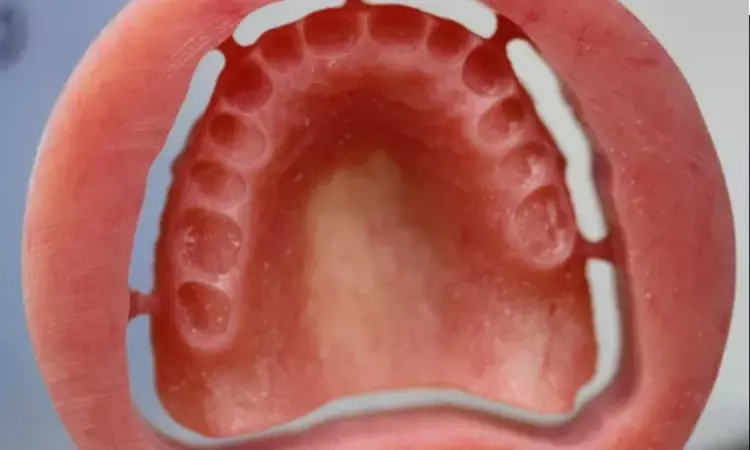- Home
- Medical news & Guidelines
- Anesthesiology
- Cardiology and CTVS
- Critical Care
- Dentistry
- Dermatology
- Diabetes and Endocrinology
- ENT
- Gastroenterology
- Medicine
- Nephrology
- Neurology
- Obstretics-Gynaecology
- Oncology
- Ophthalmology
- Orthopaedics
- Pediatrics-Neonatology
- Psychiatry
- Pulmonology
- Radiology
- Surgery
- Urology
- Laboratory Medicine
- Diet
- Nursing
- Paramedical
- Physiotherapy
- Health news
- Fact Check
- Bone Health Fact Check
- Brain Health Fact Check
- Cancer Related Fact Check
- Child Care Fact Check
- Dental and oral health fact check
- Diabetes and metabolic health fact check
- Diet and Nutrition Fact Check
- Eye and ENT Care Fact Check
- Fitness fact check
- Gut health fact check
- Heart health fact check
- Kidney health fact check
- Medical education fact check
- Men's health fact check
- Respiratory fact check
- Skin and hair care fact check
- Vaccine and Immunization fact check
- Women's health fact check
- AYUSH
- State News
- Andaman and Nicobar Islands
- Andhra Pradesh
- Arunachal Pradesh
- Assam
- Bihar
- Chandigarh
- Chattisgarh
- Dadra and Nagar Haveli
- Daman and Diu
- Delhi
- Goa
- Gujarat
- Haryana
- Himachal Pradesh
- Jammu & Kashmir
- Jharkhand
- Karnataka
- Kerala
- Ladakh
- Lakshadweep
- Madhya Pradesh
- Maharashtra
- Manipur
- Meghalaya
- Mizoram
- Nagaland
- Odisha
- Puducherry
- Punjab
- Rajasthan
- Sikkim
- Tamil Nadu
- Telangana
- Tripura
- Uttar Pradesh
- Uttrakhand
- West Bengal
- Medical Education
- Industry
Methylmethacrylate concentrations significantly lower in 3D-printed removable complete dentures

Methylmethacrylate concentrations (MMCs) are significantly lower in 3D-printed removable complete dentures (RCDs), according to a recent study published in the Journal of Dentistry.
The study aimed to quantitatively evaluate the elution of methylmethacrylate from CAD-CAM manufactured removable complete dentures (RCDs) using high-performance liquid chromatography (HPLC).
Thirty-two RCDs were manufactured following either the CNC-milling (Milled: n=8) or the 3D-printing (n=24) protocols. The 3D-printed dentures were further categorized into three groups based on their post-production rinsing cycles [Extended wash cycle (EWC), Standard wash cycle (SWC), and SWC with an additional Durécon coating (SWC2)]. HPLC was used to evaluate the methylmethacrylate concentrations (MMCs) eluted from the dentures in each group for different time periods (1, 2, 4, 8, and 24 hours). Mean and standard deviations were calculated for the MMCs; data was verified for normal distribution, ANOVA and post hoc tests were applied for statistical analyses (⍺=0.05).
Results:
The HPLC revealed that all the denture groups recorded some amounts of MMCs, with significant differences [F (3, 31) = 23.646, p<0.0001]. The milled denture group had the highest MMCs at 24 hours when compared to the EWC (p<0.0001), SWC (p=0.001), and SWC2 (p<0.0001) denture groups. SWC had a higher MMC than EWC (p=0.032) and SWC2 (p=0.015). No differences were found in MMCs when comparing EWC and SWC2 (p=0.989).
Thus, Methylmethacrylate concentrations were significantly lower in 3D-printed RCDs than in milled RCDs when using the resins employed in this study. Furthermore, the MMCs can be further decreased in 3D-printed RCDs when coated with an additional thin protective layer (Durécon) by following the manufacturer-recommended rinsing protocol or when an extended isopropanol wash cycle is adopted.
Reference:
Analysis of the residual monomer content in milled and 3D-printed removable CAD-CAM complete dentures: an in vitro study by Murali Srinivasan et al. published in the Journal Of Dentistry.
https://www.sciencedirect.com/science/article/pii/S0300571222001518
Dr. Shravani Dali has completed her BDS from Pravara institute of medical sciences, loni. Following which she extensively worked in the healthcare sector for 2+ years. She has been actively involved in writing blogs in field of health and wellness. Currently she is pursuing her Masters of public health-health administration from Tata institute of social sciences. She can be contacted at editorial@medicaldialogues.in.
Dr Kamal Kant Kohli-MBBS, DTCD- a chest specialist with more than 30 years of practice and a flair for writing clinical articles, Dr Kamal Kant Kohli joined Medical Dialogues as a Chief Editor of Medical News. Besides writing articles, as an editor, he proofreads and verifies all the medical content published on Medical Dialogues including those coming from journals, studies,medical conferences,guidelines etc. Email: drkohli@medicaldialogues.in. Contact no. 011-43720751


